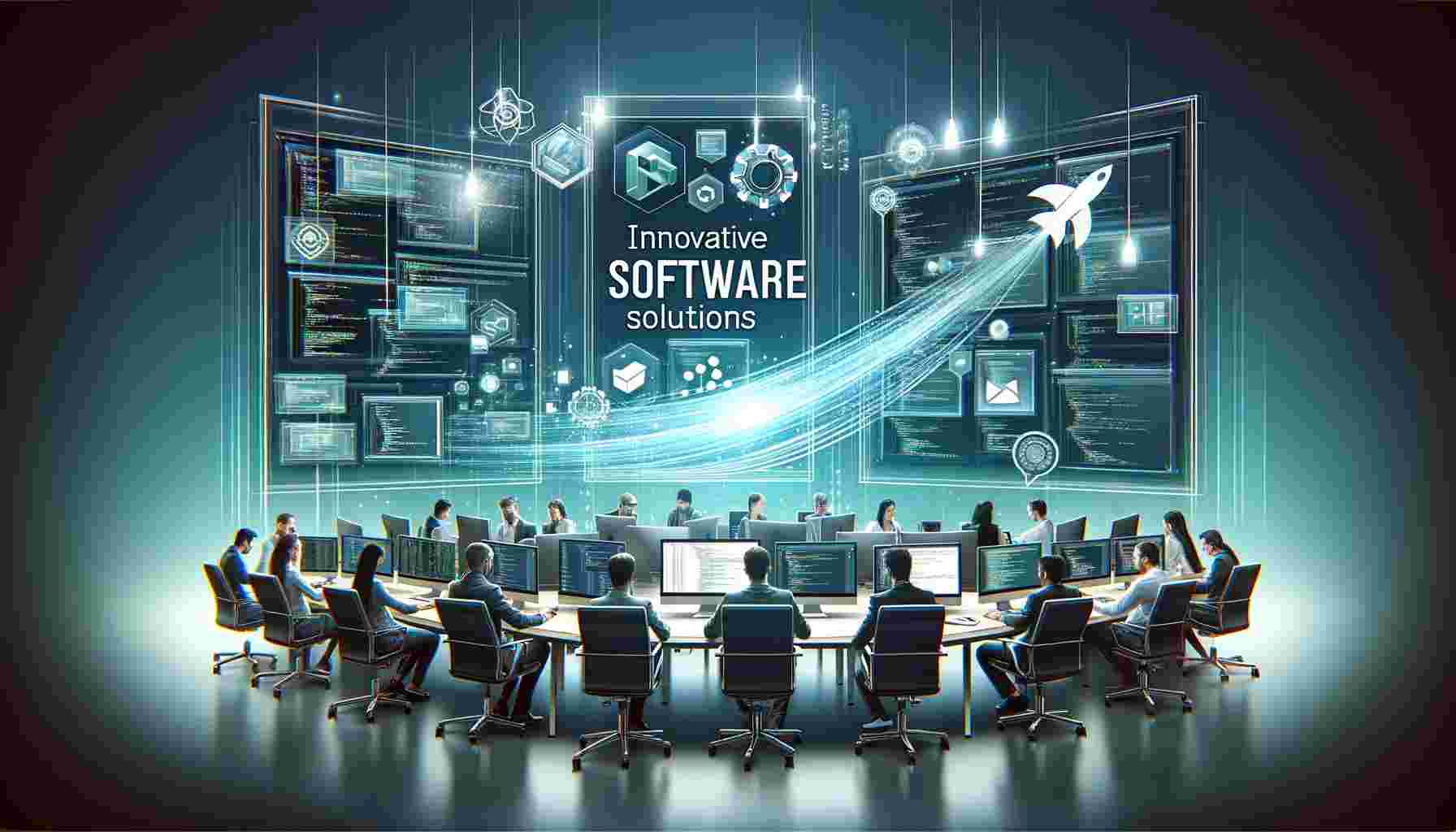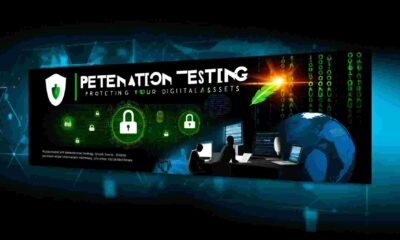Tech
Wholesale Distribution ERP Software: Streamline Your Operations with the Right Solution

Wholesale distribution businesses are constantly seeking ways to streamline their operations and improve efficiency. One way to achieve this is by implementing an enterprise resource planning (ERP) software solution. ERP software is a powerful tool that can help businesses manage their inventory, sales, and finances all in one place.
For wholesale distribution businesses, ERP software can be particularly beneficial. These businesses often deal with large volumes of inventory and complex supply chains. With ERP software, they can gain better visibility into their inventory levels and track their products from the moment they are received to the moment they are shipped out. This can help them make better decisions about when to reorder products and how much to order, ultimately leading to cost savings and improved customer satisfaction.
When it comes to choosing an ERP software solution for wholesale distribution businesses, there are many options available. It’s important to find a solution that meets the specific needs of the business, including features such as inventory management, sales order processing, and financial reporting. With the right ERP software in place, wholesale distribution businesses can improve their operations and stay competitive in today’s fast-paced business environment.
Core Features of Wholesale Distribution ERP Software
Wholesale distribution ERP software is designed to streamline and automate various processes involved in wholesale distribution businesses. It offers a range of features that help businesses manage their inventory, orders, customers, supply chain, financials, and more. Here are some of the core features of wholesale distribution ERP software:
Inventory Management
Inventory management is a critical aspect of wholesale distribution businesses. Wholesale distribution ERP software provides businesses with real-time visibility into their inventory levels and helps them manage their inventory efficiently. It allows businesses to track their inventory across multiple warehouses, manage stock levels, set reorder points, and automate the process of replenishing stock.
Order Processing
Order processing is another crucial aspect of wholesale distribution businesses. Wholesale distribution ERP software helps businesses manage their orders efficiently, from order entry to fulfillment. It allows businesses to automate order processing, track orders in real-time, manage backorders, and generate invoices.
Customer Relationship Management
Customer relationship management is essential for businesses to maintain long-term relationships with their customers. Wholesale distribution ERP software provides businesses with tools to manage their customer data, track customer interactions, and analyze customer behavior. It allows businesses to personalize their customer interactions, improve customer satisfaction, and increase customer loyalty.
Supply Chain Management
Supply chain management is critical for wholesale distribution businesses to ensure timely delivery of products to their customers. Wholesale distribution ERP software provides businesses with tools to manage their supply chain efficiently, from procurement to delivery. It allows businesses to track purchase orders, manage vendors, optimize inventory levels, and manage shipping and logistics.
Financial Management
Financial management is essential for businesses to manage their finances efficiently and make informed decisions. Wholesale distribution ERP software provides businesses with tools to manage their financials, including accounts payable, accounts receivable, general ledger, and more. It allows businesses to generate financial reports, track cash flow, and manage budgets.
Reporting and Analytics
Reporting and analytics are critical for businesses to make informed decisions and improve their operations. Wholesale distribution ERP software provides businesses with tools to generate reports and analyze data. It allows businesses to track key performance indicators, identify trends, and make data-driven decisions.
In summary, wholesale distribution ERP software offers a range of core features that help businesses manage their inventory, orders, customers, supply chain, financials, and more. These features help businesses streamline their operations, improve efficiency, and make informed decisions.
Implementation and Integration
Wholesale distribution ERP software implementation and integration can be a complex process that requires careful planning and execution. The following subsections will provide an overview of some of the key considerations for successful implementation and integration.
System Customization
One of the most important aspects of implementing wholesale distribution ERP software is customization. Every business has unique needs and processes, and the ERP software must be tailored to meet those needs. The software vendor should work closely with the business to understand its requirements and develop a customized solution that meets those requirements. This may include customizing workflows, reports, and user interfaces.
Data Migration
Data migration is another critical aspect of ERP software implementation. The ERP system must be able to import data from the existing systems and databases used by the business. This includes customer data, product data, inventory data, and transactional data. The data must be cleaned, transformed, and validated to ensure accuracy and completeness. The vendor should provide tools and services to facilitate data migration and ensure a smooth transition.
Training and Support
Training and support are essential for successful ERP software implementation and adoption. The vendor should provide comprehensive training to the business’s employees on how to use the software effectively. The training should cover all aspects of the software, including workflows, reports, and user interfaces. The vendor should also provide ongoing support to address any issues or questions that arise during implementation and beyond.
Integration with Other Systems
Wholesale distribution businesses often use multiple systems to manage their operations, such as accounting software, CRM systems, and e-commerce platforms. The ERP software must be able to integrate seamlessly with these systems to ensure data consistency and accuracy. The vendor should provide integration tools and services to facilitate this integration, and ensure that the ERP system can communicate effectively with other systems.
In summary, successful implementation and integration of wholesale distribution ERP software requires careful planning, customization, data migration, training, and support. The vendor should work closely with the business to understand its unique needs and develop a customized solution that meets those needs. The vendor should also provide comprehensive training and ongoing support to ensure successful adoption and use of the software.
Tech
Online Video Lectures: The Future of Learning

Online video lectures have revolutionized the way people learn and acquire knowledge. With the advent of the internet, students and professionals can now access educational material from anywhere in the world, at any time. Online video lectures offer a flexible and convenient way of learning, allowing individuals to study at their own pace and on their own schedule.
One of the main advantages of online video lectures is the ability to pause, rewind, and replay the content as many times as needed. This feature allows learners to fully understand the material and reinforce their knowledge. In addition, online video lectures often come with supplementary resources such as quizzes, assignments, and discussion forums, which further enhance the learning experience.
Overall, online video lectures have become an indispensable tool for anyone looking to expand their knowledge and skills. Whether you are a student, a professional, or simply someone interested in learning new things, online video lectures offer a convenient, flexible, and effective way of acquiring knowledge.
Fundamentals of Online Video Lectures
Evolution of E-Learning
Online video lectures are a product of the evolution of e-learning. E-learning involves the use of technology to deliver educational content. It has become increasingly popular over the years due to its flexibility and convenience. Online video lectures are a form of e-learning that allows students to access educational content anytime and anywhere. They can be accessed through various devices such as laptops, tablets, and smartphones.
Benefits of Video Lectures
Online video lectures have several benefits. First, they provide students with the flexibility to learn at their own pace. Students can pause, rewind, and replay lectures as many times as they want. Second, they allow students to access educational content from anywhere in the world. This is particularly beneficial for students who cannot attend traditional classes due to geographical or time constraints. Third, online video lectures are cost-effective. They eliminate the need for students to travel to a physical location to attend classes, which reduces transportation costs.
Key Components of Effective Lectures
Effective online video lectures have several key components. First, they should be well-structured and organized. Lectures should be broken down into manageable sections to make it easier for students to follow along. Second, lectures should be engaging and interactive. Lecturers should use visuals, animations, and other multimedia to make the lectures more interesting. Third, lectures should be accessible. Lecturers should ensure that the lectures are compatible with various devices and that they are accessible to students with disabilities.
Overall, online video lectures are an effective way to deliver educational content to students. They provide students with the flexibility to learn at their own pace, access educational content from anywhere in the world, and are cost-effective. Effective online video lectures have several key components, including being well-structured, engaging, and accessible.
Creating and Accessing Video Lectures
Designing Engaging Content
When creating online video lectures, it is important to design engaging content that captures and maintains the attention of learners. To achieve this, instructors can use various techniques, such as incorporating multimedia elements, using storytelling, and providing real-world examples.
Using multimedia elements, such as images, audio, and video, can help to break up the monotony of a lecture and provide visual and auditory stimulation to learners. Storytelling can also be an effective way to engage learners by making the material more relatable and memorable. Additionally, providing real-world examples can help learners to understand how the concepts being taught apply in practical situations.
Platforms for Hosting Video Lectures
There are several platforms available for hosting and sharing online video lectures. Some popular options include YouTube, Vimeo, and Udemy. Each platform has its own unique features and benefits, so it is important to choose the one that best suits the needs of the instructor and learners.
YouTube is a free platform that allows instructors to easily upload and share video lectures. Vimeo is another popular option that offers more advanced features and customization options. Udemy is a paid platform that provides a comprehensive e-learning experience, including course creation tools and a built-in audience.
Best Practices for Learners
When accessing online video lectures, learners should follow best practices to ensure they get the most out of the experience. This includes finding a quiet and distraction-free environment, taking notes, and actively engaging with the material.
Finding a quiet and distraction-free environment can help learners to focus on the material and retain more information. Taking notes can also be an effective way to reinforce learning and aid in retention. Additionally, actively engaging with the material, such as by asking questions or participating in discussions, can help to deepen understanding and promote critical thinking.
Tech
Hire Developers in India: A Comprehensive Guide

India has become a hub for outsourcing software development due to its large pool of talented developers and cost-effective services. Many companies around the world are turning to India to hire developers for their projects. In recent years, India has emerged as a leading destination for hiring developers, particularly in the tech industry.
One of the main reasons why India is a popular choice for hiring developers is the cost advantage. Compared to developers in other countries, Indian developers offer competitive rates while still maintaining high-quality work. This has made it an attractive option for companies looking to reduce their development costs without compromising on the quality of their products. Additionally, India has a large number of skilled developers who are well-versed in the latest technologies and programming languages.
Overall, Hire Developers in India can be a smart choice for companies looking to expand their development team or outsource their software development projects. With a large pool of talented developers and cost-effective services, India has become a go-to destination for companies in need of skilled developers.
Understanding the Indian Developer Landscape
Market Overview
India is a rapidly growing hub for software development, with a large pool of talented and skilled developers. The country has a vast IT sector, with many software development companies and startups operating in various domains. According to a report by NASSCOM, the Indian IT industry is expected to reach $350 billion by 2025, with a projected growth rate of 7.7%.
Skill Sets Available
Indian developers are known for their proficiency in a wide range of programming languages, including Java, Python, PHP, and JavaScript. They are also skilled in various frameworks and technologies like React, Angular, Node.js, and Spring. Many developers in India have experience in working on complex projects, making them well-suited for enterprise-level software development.
Cost Advantages
One of the significant advantages of hiring developers in India is the cost-effectiveness. The cost of hiring a developer in India is significantly lower than that of hiring a developer in the US or Europe. This cost advantage can be attributed to the lower cost of living in India and the availability of a large pool of skilled developers.
Overall, the Indian developer landscape offers a compelling value proposition for companies looking to hire developers. With a vast talent pool, proficiency in various programming languages and technologies, and cost advantages, India is an attractive destination for software development outsourcing.
Best Practices for Hiring Developers in India
Identifying Talent
When it comes to hiring developers in India, identifying the right talent is key. One of the best ways to do this is to look for developers who have experience working on similar projects to yours. You can also look for developers who have experience working with the specific technologies and tools that your project requires.
Another important factor to consider is communication skills. While technical skills are important, developers who can communicate effectively in English will be better equipped to work with your team and ensure that your project is completed successfully.
Conducting Effective Interviews
Once you have identified potential candidates, it’s important to conduct effective interviews. This can involve asking technical questions to assess their skills, as well as behavioral questions to evaluate their communication and problem-solving abilities.
It’s also a good idea to involve your existing team in the interview process. This can help ensure that the candidate will be a good fit for your team culture and that they will be able to work collaboratively with your existing developers.
Legal and Contractual Considerations
When hiring developers in India, it’s important to be aware of the legal and contractual considerations involved. This can include issues such as intellectual property rights, non-disclosure agreements, and payment terms.
To ensure that everything is handled properly, it’s a good idea to work with a legal professional who is familiar with Indian laws and regulations. This can help ensure that your project is legally protected and that your contract with the developer is fair and reasonable.
By following these best practices, you can increase your chances of hiring the right developers in India for your project and ensuring its success.
Tech
Multimedia Content Development Company: Creating Engaging and Dynamic Digital Content

A multimedia content development company is a business that specializes in creating and producing various types of multimedia content such as videos, animations, graphics, and audio content. These companies offer a wide range of services to clients, including concept development, scriptwriting, storyboarding, filming, editing, and post-production.
Multimedia content development companies have become increasingly popular in recent years due to the growing demand for engaging and interactive content. With the rise of social media and digital marketing, businesses are looking for creative ways to capture their audience’s attention and stand out from the competition. A multimedia content development company can help businesses achieve this goal by creating high-quality and visually appealing content that resonates with their target audience.
Core Services
Custom Multimedia Design
The Multimedia Content Development Company specializes in creating custom multimedia designs for clients. Their team of experienced designers works closely with clients to understand their requirements and create unique designs that meet their needs. They offer a wide range of multimedia design services, including graphic design, animation, and interactive design.
Clients can choose from a variety of design options, including 2D and 3D graphics, vector art, and custom animations. The company’s designers are skilled in using industry-standard software such as Adobe Photoshop, Illustrator, and After Effects, ensuring that clients receive high-quality designs that meet their specifications.
Interactive Media Solutions
The company offers a range of interactive media solutions that help clients engage their audience and enhance their brand. Their team of experts can create interactive presentations, e-learning modules, games, and simulations that are both engaging and informative.
Using the latest multimedia technologies, the company’s interactive media solutions are designed to work seamlessly across multiple platforms, including desktop and mobile devices. Clients can also benefit from the company’s expertise in creating interactive touch-screen kiosks and digital signage displays.
Video Production and Editing
The Multimedia Content Development Company has a team of experienced video producers and editors who can create high-quality videos that meet clients’ needs. They offer a range of video production services, including scriptwriting, storyboarding, filming, and post-production editing.
Clients can choose from a variety of video styles, including corporate videos, product demos, training videos, and promotional videos. The company’s video production team works closely with clients to ensure that their videos are tailored to their specific needs and goals.
Overall, the Multimedia Content Development Company’s core services offer clients a range of multimedia solutions that are designed to enhance their brand, engage their audience, and meet their business objectives.
Industry Specialization
E-Learning and Educational Content
Multimedia Content Development Company has extensive experience in developing multimedia content for e-learning and educational purposes. The company has a team of experts who specialize in creating engaging and interactive content that can be used in various educational settings. They have worked with clients in the education sector to develop content for e-learning platforms, online courses, and educational software.
The company uses a variety of multimedia tools such as videos, animations, simulations, and interactive quizzes to create engaging and effective educational content. They also ensure that the content is accessible and user-friendly, making it easy for learners to navigate and understand.
Corporate Branding and Marketing
Multimedia Content Development Company offers a range of services to help businesses build their brand and promote their products and services. The company has a team of creative professionals who specialize in creating multimedia content for marketing and advertising purposes. They work closely with clients to understand their brand and target audience, and then develop content that resonates with them.
The company’s services include creating videos, animations, infographics, and other multimedia content that can be used in various marketing campaigns. They also offer web design and development services to help businesses create a strong online presence.
Entertainment and Gaming
Multimedia Content Development Company has a team of experts who specialize in creating multimedia content for the entertainment and gaming industry. They have worked with clients to develop content for video games, mobile apps, and other digital entertainment platforms.
The company uses a variety of multimedia tools such as 3D modeling, animation, and sound design to create engaging and immersive content. They also ensure that the content is optimized for different platforms and devices, making it accessible to a wider audience.
In summary, Multimedia Content Development Company has a strong industry specialization in e-learning and educational content, corporate branding and marketing, and entertainment and gaming. Their team of experts uses a variety of multimedia tools to create engaging and effective content that meets the needs of their clients.
-

 Tech10 months ago
Tech10 months agoModyukle: Understanding the Basics of this Innovative Technology
-

 Blog10 months ago
Blog10 months agoAndre Hakkak Net Worth: A Look at the Wealth of the Businessman
-
Tech10 months ago
Expotab.com Login: How to Access Your Account
-

 Business10 months ago
Business10 months agoCash Discount Merchant Services: Everything You Need to Know
-

 Blog10 months ago
Blog10 months agoJack Doherty Net Worth: How Much is the Social Media Star Worth?
-

 Health10 months ago
Health10 months agoWell Health Tips in Hindi: Organic Ways to Improve Your Overall Health
-

 Tech10 months ago
Tech10 months agoSecurity Testing Company: Ensuring Your Business’s Safety
-

 Business10 months ago
Business10 months agoCarpenter’s Hatchet: The Essential Tool for Woodworking





